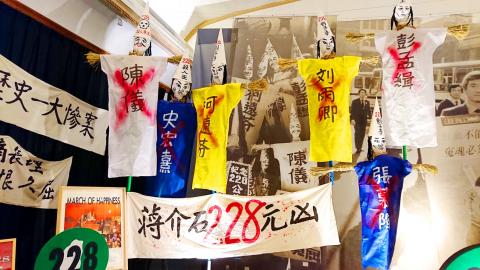The Ministry of the Interior is proposing the abolition of regulations guiding portrayals of former president Chiang Kai-shek (蔣介石), Minister of the Interior Yeh Jiunn-rong (葉俊榮) said yesterday at the Legislative Yuan.
Democratic Progressive Party (DPP) Legislator Kolas Yotaka asked Yeh about the Notice Regarding the Construction of Statues for the Honorable Former President Chiang (塑建總統 蔣公銅像注意事項) which was promulgated by the ministry in 1975, shortly after Chiang’s death.
The notice requires statues to portray Chiang as being “amiable,” “dignified” and bearing “revolutionary spirit which includes compassion, wisdom, bravery, perseverance and optimism.”

Photo: Chen Yu-fu, Taipei Times
The notice requires the addition of Chiang’s final words to the base of statues and includes instructions for environment and height, mandating pedestals stand at least 2m tall.
“Anyone viewing the statue is supposed to have to look up to Chiang,” Kolas said.
“These kind of regulations reflect the reality of the development process Taiwan has gone through,” Yeh said, adding that he had not been aware of the regulations’ continued existence.
“I want to abolish it quickly,” he said, assuming it remains valid.
The future of public statues of Chiang has been a point of contention as the DPP government pushes for transitional justice legislation, with numerous acts of protest vandalism committed against Chiang statues every year.
Many statues have been removed, with more than 200 currently interned at Chiang’s Cihu Mausoleum in Taoyuan, where they were moved after former sites disposed of them.
Meanwhile, when asked if he would continue to represent the central government in attending annual sacrifices to Koxinga (鄭成功) next month, Yeh said his schedule has yet to be determined.
Kolas, an Amis, called for Yeh to refrain from participation to show cultural sensitivity, because Koxinga’s conquest of the island marked the beginning of Han Chinese rule and the subsequent displacement of Aboriginals.

‘DENIAL DEFENSE’: The US would increase its military presence with uncrewed ships, and submarines, while boosting defense in the Indo-Pacific, a Pete Hegseth memo said The US is reorienting its military strategy to focus primarily on deterring a potential Chinese invasion of Taiwan, a memo signed by US Secretary of Defense Pete Hegseth showed. The memo also called on Taiwan to increase its defense spending. The document, known as the “Interim National Defense Strategic Guidance,” was distributed this month and detailed the national defense plans of US President Donald Trump’s administration, an article in the Washington Post said on Saturday. It outlines how the US can prepare for a potential war with China and defend itself from threats in the “near abroad,” including Greenland and the Panama

The High Prosecutors’ Office yesterday withdrew an appeal against the acquittal of a former bank manager 22 years after his death, marking Taiwan’s first instance of prosecutors rendering posthumous justice to a wrongfully convicted defendant. Chu Ching-en (諸慶恩) — formerly a manager at the Taipei branch of BNP Paribas — was in 1999 accused by Weng Mao-chung (翁茂鍾), then-president of Chia Her Industrial Co, of forging a request for a fixed deposit of US$10 million by I-Hwa Industrial Co, a subsidiary of Chia Her, which was used as collateral. Chu was ruled not guilty in the first trial, but was found guilty

A wild live dugong was found in Taiwan for the first time in 88 years, after it was accidentally caught by a fisher’s net on Tuesday in Yilan County’s Fenniaolin (粉鳥林). This is the first sighting of the species in Taiwan since 1937, having already been considered “extinct” in the country and considered as “vulnerable” by the International Union for Conservation of Nature. A fisher surnamed Chen (陳) went to Fenniaolin to collect the fish in his netting, but instead caught a 3m long, 500kg dugong. The fisher released the animal back into the wild, not realizing it was an endangered species at

DEADLOCK: As the commission is unable to forum a quorum to review license renewal applications, the channel operators are not at fault and can air past their license date The National Communications Commission (NCC) yesterday said that the Public Television Service (PTS) and 36 other television and radio broadcasters could continue airing, despite the commission’s inability to meet a quorum to review their license renewal applications. The licenses of PTS and the other channels are set to expire between this month and June. The National Communications Commission Organization Act (國家通訊傳播委員會組織法) stipulates that the commission must meet the mandated quorum of four to hold a valid meeting. The seven-member commission currently has only three commissioners. “We have informed the channel operators of the progress we have made in reviewing their license renewal applications, and